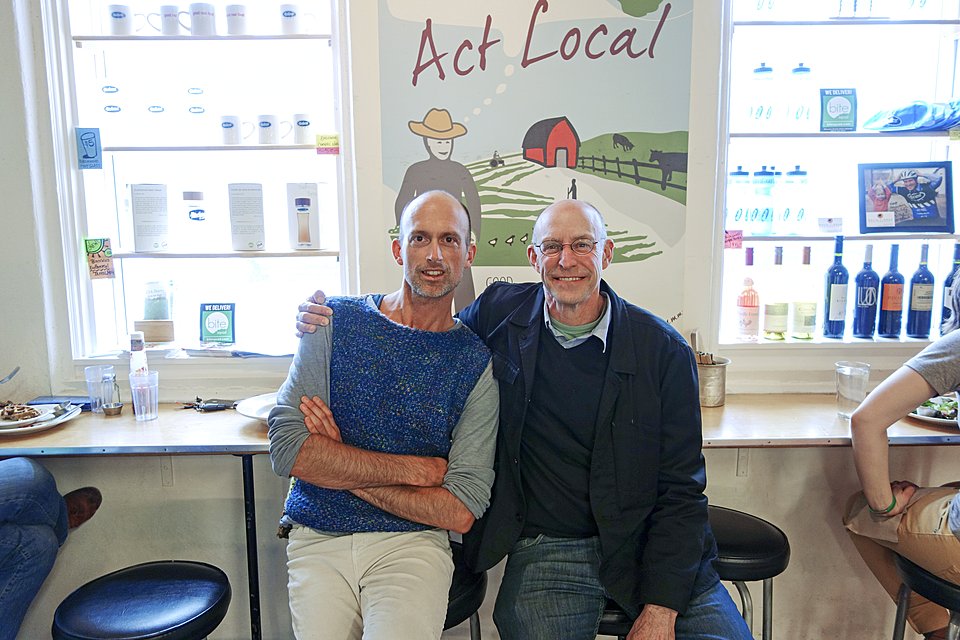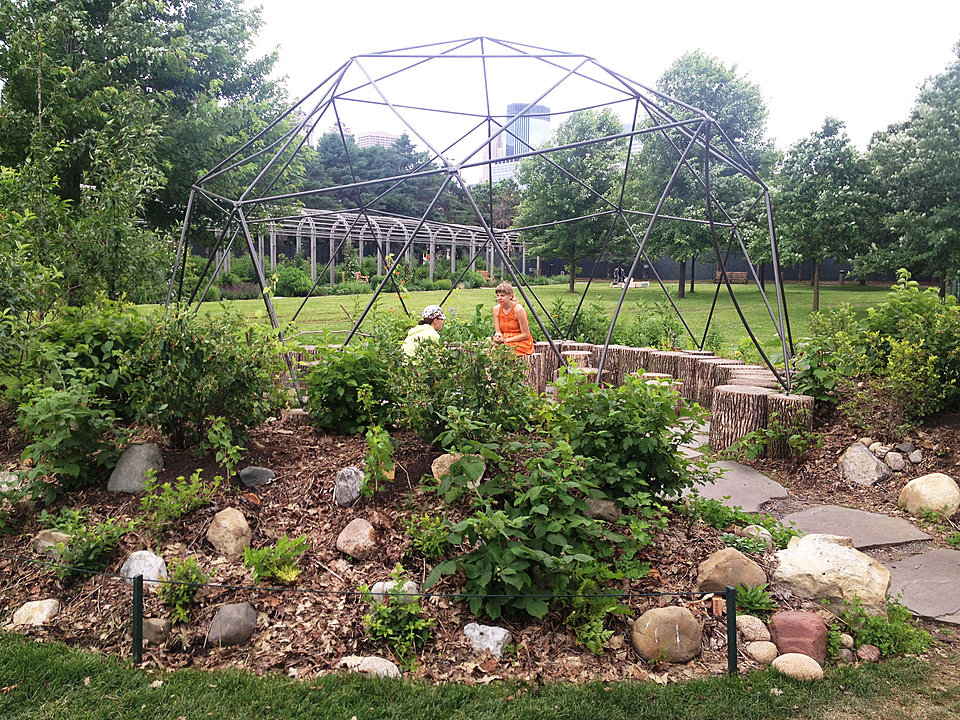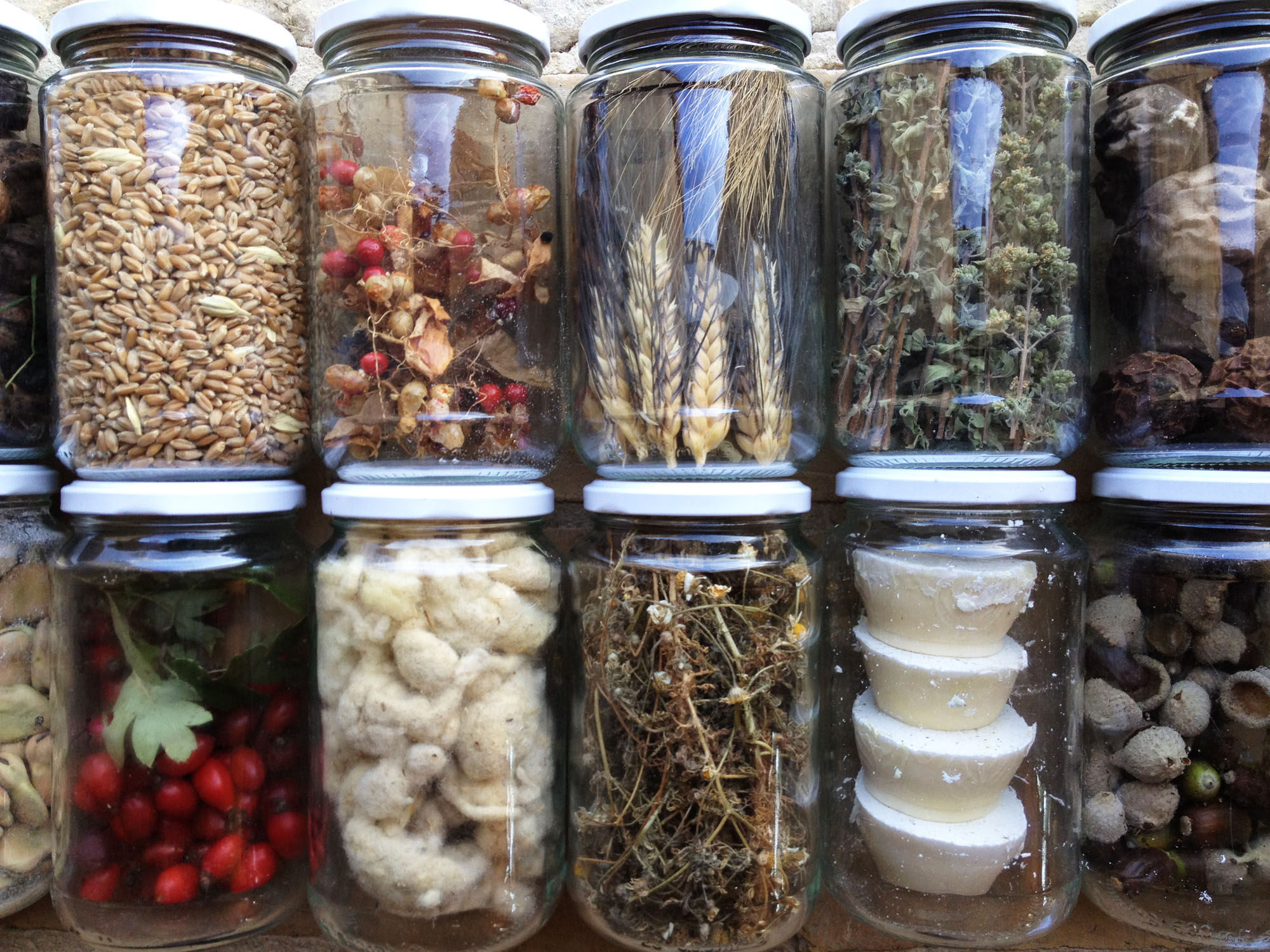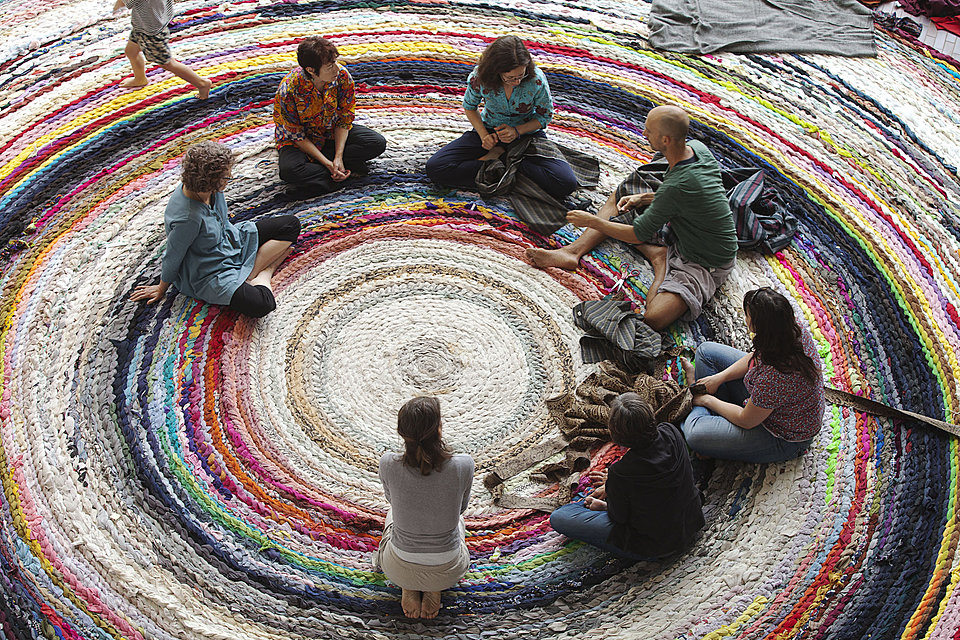
Artist Fritz Haeg and author Michael Pollan are on parallel trajectories these days: both food activists and gardening enthusiasts, they're pursuing the next steps of their work--going from the garden into the home. For Pollan, that shift is manifest in his new book Cooked: A Natural History of Transformation, which brings ideas from earlier works The Omnivore's Dilemma and The Botany of Desire into his own kitchen. For Haeg, it's illustrated by Domestic Integrities, which shares material from the harvest on an enormous, hand-made rug. At its current installation at the Walker Art Center, the project will be sourced mainly from the yields of Haeg's Foraging Circle, planted in the Minneapolis Sculpture Garden in spring 2013.
Braving a rare spring blizzard, they both found themselves in Minneapolis this May, Pollan on a book tour and Haeg as part of his three-part Walker residency, At Home in the City. Their meeting was a reunion of sorts: Pollan contributed an essay to Haeg's Edible Estates book, and Haeg visited Pollan's Edible Education class last fall (the brainchild of Alice Waters, the founder of Chez Panisse and Edible Schoolyards, the UC-Berkeley classes are archived online). During a conversation at Minneapolis locavore destination the Birchwood Café, the pair discussed a revival of the domestic, ecology as a narrative tool, and Wendell Berry's notion that "eating is an agricultural act."
Fritz Haeg: I'm sure it will be nice for you to return to California again today after so many weeks on the road.
Michael Pollan: For me, it's the light when I get off the plane. I grew up on Long Island, and for me getting to California was like, wow, I really need all this light!

Haeg: I'm the same way. The winter weather here is a shock after being on a farm in Italy with summer weather for the past few weeks.
Pollan: Tell me about that experience. What were you doing there?
Haeg: Pollinaria is an old family farm run by a visionary academic named Gaetano Carboni. He recently initiated an artist residency program, inviting one artist a year to do a project. I have been working on the traveling Domestic Integrities project there, visiting every season for a few weeks this year. In the US there have been editions at MoMA in New York and the Hammer Museum in Los Angeles. Next it comes here to the Walker in August. The project is presented on a big circular traveling rug crocheted out of old clothes.
Pollan: Yeah, I saw the images of that.
Haeg: Every time I go for a season, friends from Rome and Italy come, and we forage, and we bake bread, and we cook. Basically it's a way of living in the land and finding out what's there in that moment and then using it there in the house. So the rug is where things go when they come indoors. After doing gardens for 10 years, it's the next step in my work the same way your Cooked book is for you, which is: now that we have this food that we've talked about for so long, what do we do with it and how does it enter into the house. But it also goes into even textiles: spinning wool and knitting with it, using the flour that they're harvesting and then baking bread with it. So basically everything on the land, we're using it.
Pollan: So it's about the processing?
Haeg: It's about the processing. That's why it was so cool to see you after a week and a half there, because my days, morning to night, have literally been spent taking walks, gathering things, bringing them inside, and then figuring out what to do with them. It's not an empirical system, but it's a cyclical system of saying, "We have these landscapes. They're producing this food. We have this food. It's coming into the house. Now that it's here, what are we doing with it?"
Speaking of next steps, can we talk about the progression of your writing and advocacy? One thing that I think about when I think about your work right now is how far you've strayed from conventional journalism. Tell me how you feel about your role as a potential activist and how that gels with your work as a storyteller?

Pollan: It was an awkward transition, but I realized at a certain point that it was disingenuous of me to pretend I didn't have opinions. At a certain point I realized I had made conclusions about certain things, and it's disingenuous for me to pretend in my writing and my speaking that I hadn't. But I was also very fortunate that The New York Times Magazine cut me a lot of slack, even in my early pieces. By the end of the piece, they'd allow me to take a position. The editors there were very supportive, partly because -- frankly --
they didn't understand there are two sides to this issue.
Haeg: And maybe they thought food wasn't so contentious.
Pollan: That's right. They had never heard from the people who my work was making uncomfortable. They weren't reading about industrial agriculture; the Cargills, General Mills, all those companies were really not their advertisers, so they didn't think it was controversial work, which served my purposes really well. I think that's changed now.
Haeg: So how do you identify yourself now?
Pollan: Still as a writer and a storyteller. And I do advocate for certain things. I advocate for reforming the food system. I still think of myself as a journalist. The way I see it, journalism is one set of tools -- one toolkit I have. One vocabulary, one lens. But there are others that I like, too: History. Science. Philosophy. When my writing is working the way I want it to, it's layering those perspectives. I came of age as a writer with a kind of self-consciousness about epistemology -- that there wasn't one final vocabulary that had all the answers.
Haeg: Like indoctrinated into something?
Pollan: Yeah, and that science wasn't always the last word. And there was also poetry. And sometimes the poets got there before the scientists. Sometimes the scientists got there first. Sometimes the grandmothers got there first. That point I made about folk microbiology at last night's talk, I thought that was such a beautiful thing, that this traditional method discovered by trial and error had figured out a solution to a health problem, a food-safety problem, before the microbiologists even knew what a lactobacillus was. [Also shared with NPR listeners recently, Pollan told how a French nun began studying microbiology to defend a traditional -- and more sanitary -- method of cheesemaking]. So I don't privilege any vocabulary, and I find in combination they get really interesting.
Haeg:
My favorite part of your book is in the introduction where you talk about specialization, because every lecture I do, I start out with this quote from Buckminster Fuller: "Specialization is in fact only a fancy form of slavery wherein the 'expert' is fooled into accepting a slavery by making him feel that he in turn is a socially and culturally preferred -- ergo, highly secure -- lifelong position" [from Fuller's Operating Manual for Spaceship Earth, 1968].
Pollan: That's a fantastic quote.
Haeg: I start every lecture with it because usually I talk to students, and students are in the belly of the beast of dogma. They're in the belly of the beast of indoctrination into a discipline.
Pollan: Yeah, they have a major.
Haeg: They have a major, and they feel secure in it. I know that's good, and I know you can blossom by going deep into something. But I also think there's the potential to feel like: this is it. You made that point last night: If I'm entering into a world where I'm valued for one thing and I have to rely on experts to do everything else for me, the role of the expert is then so confused. That people don't feel qualified to make their own meals anymore, that's tragic.
Pollan: Wendell Berry says this: Specialization is the great evil of civilization. You should read him on some of these issues. He's very good on specialization and work. We specialize, and it gives us a certain power, and we automatically assume our chosen vocabulary is The One That Explains the Most. The economists now have it. All this behavioral economics -- the Freakonomics stuff -- the arrogance that they have figured out human motivation, it's just like Freud a hundred years ago. The arrogance has moved into economics. I just distrust all those vocabularies. The only one I have any trust in is storytelling -- there's a couple I have a lot of trust in. Ecology. I think ecology is powerful. But ecology is narrative. It's connecting things: showing how this leads to that. And I use ecology in my work as a narrative tool: this allows me to go here. I can jump-cut because I know that corn field is really a fossil fuel field. I know you need that fossil fuel to grow that corn, so now I can go to the oil fields of the Middle East if I want.
Haeg: Another thing about being a journalist -- and I feel this as an artist, too -- is that you not only have the license, but actually the responsibility, to move laterally. If your original interest is in architecture and then you move over to gardens and then you move over to food and then over to cooking, or whatever, that is part of the art of being a journalist. You seem to take advantage of that freedom.
Pollan: I need to move because I don't like writing as an expert. I like writing as an amateur. I like writing as an idiot. It's much more fun to start in ignorance. So certain topics, once I do know a lot about them, it's hard to find the place to write about them from. That's one of the reasons I was drawn to cooking. There's so much I don't know. Most of my works are narratives in self-education.
Haeg: I can't tell you how many people I talked to, especially fellow gardeners, who had the same experience as I did with your book The Omnivore's Dilemma, where a switch went on and everything changed. Interesting gardens were suddenly articulated in ways we hadn't really read before.
Pollan: Because it's connected to other things.
Haeg: And because it was you out in a domestic-scaled environment that everyone could relate to, confronting it. It was the catalyst to bigger things.
Pollan: There's a lot of failure in that book, too, right? I'm making mistakes.
Haeg: That's why it's so strong, I think. This makes me wonder: at some point, will you feel like too much an expert on food and get bored with it?
Pollan: I don't know. There still is stuff I don't know. I keep thinking I'm done, and then there's some angle that I realize I need to explore. It's not a subject; it's a medium. It can take you into economics. It can take you into health. It can take you into agriculture. It can take you into power. I haven't found it confining yet.
I mean, I've been thinking -- and this is relevant to your work -- that someone needs to write an Omnivore's Dilemma for clothing. What happened last week in Bangladesh [the deadliest garment-factory accident in history, the collapse of Rana Plaza killed 1,129 workers]. I've been thinking about this a lot. What you're wearing is an agricultural product. Nobody thinks of clothes as agricultural.
Haeg: That's so funny that you're saying this because I made this sweater vest.
Pollan: You did? It's very cool.
Haeg: I'm spinning all the wool from my Abruzzen sheep into yarn and I'm knitting with it, and it takes forever. All of my work is in textiles this past year with Domestic Integrities, and it's funny that your head is going to that, because there is a connection.
Pollan: Here's the connection: it's harder for us to see it in our clothing because it's just an object. We still have a memory that this stuff grows, and we've seen it grow around us, but nobody's seen clothing get made for a very long time. We've hidden it in places like Bangladesh. I think it's a really important book to be written. I don't know if I'm the one to write it. I don't know that I have a feel for it. It's very interesting to see that there are you and several other artists who are very consumed with textiles right now.
Haeg: The amazing thing was this rug that I made in Italy. It's 18 feet in diameter. Usually we do an open call for clothes people are throwing away. We crochet the rug out of that. Every city you go to, you can get a mountain of clothes people are throwing away made in China, Bangladesh, wherever. When we got to the farm in Italy a year ago, there was no available material. People aren't throwing away clothes in rural Abruzzo, but we had 80 sheep and all of their wool. We had 100 kilos of wool.
We drove around all day to look for a river. We washed it by hand in the river. Then we found someone to help us card it. We figured out a way to roll it and felt it with olive oil soap, from locally grown olives, into a cord that can then be crocheted into a rug. It took six people 10 days to do one ring. We can do a rug in two seconds when we're using clothes people are throwing away in the cities.
Pollan: You were taking it back to the source.
Haeg: It was like making this sweater. Making my clothes now, I feel much more connected to that story in the same way that we talk about food. I feel like I go through the same cycles where I was an architect when I was really young and then I moved to gardens and I'm interested in dance.
You know that feeling when you're maybe 21 or something and someone has just blown your mind because they've shown you this new world with the way of doing things that you didn't know existed? You're a total neophyte, and there's nothing to be jaded about yet. Everything is exciting.

Pollan: Everything is possible.
Haeg: One last thing I wanted to talk to you about is something that I feel is really consistent in all of your work and that also resonates on this path I've been on with my work: this notion of always returning to the almost cellular unit of the domestic environment in a home. You've been thoughtful about the home you've built, the garden you've planted, and the food you put in your house. Same with me: I started a series of salons at my geodesic dome -- performances and music and events and stuff.
Pollan: You showed some slides of that in my class. They were great.
Haeg: I didn't think much of it at the time. It was just what I did and what I felt like I needed in my life, but later, upon more reflection, I realized that a certain kind of radical political activity right now really wants to question private property. When you look back at the great movements of social justice, you look at, especially, the 1900s. Who was at home changing the world? Jews, women, homosexuals -- those were the ones having salons and plotting the new world order while the white men were out industrializing. It's something I've been thinking about a lot lately, that significance of the home. The idea behind the domestic gardens I've been doing and all of the Domestic Integrities is reviving domestic work, paying attention to it and putting it in a museum. It's been such a constant since the very beginning of your work, always returning to the home.
Pollan: I'm kind of a homebody, and the rhythm of my thinking and work is starting at home, going out and coming back, bringing back news, bringing back information, applying it. There's always a tension in my world between the pragmatic and the practical and the theoretical. I have a very theoretical turn of mind, but I also like to test things in place. That's my laboratory -- the home. I'm not given public spaces to work in in the way you are. I just have to do it my garden, in my kitchen, in my house. That just happens to be the venue I have as a writer.
I was also very influenced by the whole sixties idea that the personal is political. To me, that's filtered through Wendell Berry's work very often. When he says things like, "Eating is an agricultural act," he's connecting the dots between your everyday life and the world. I'm very interested in those connections and seeing the large systems that organize our world as they are reflected in the home, in our individual lives.
I find it very empowering to learn that, "OK, here's a bunch of people just making decisions about what to eat for dinner. We're building a new food economy." We all feel so helpless in the face of these huge problems, but we're not, actually. If we organize our lives in the right way, we can have a tremendous impact. One of the things that draws people to this food issue is that they are seeing it happen in front of their eyes.
